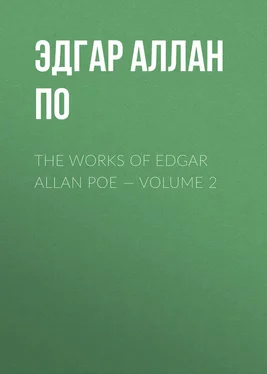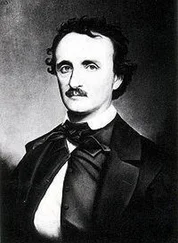Эдгар По - The Works of Edgar Allan Poe — Volume 2
Здесь есть возможность читать онлайн «Эдгар По - The Works of Edgar Allan Poe — Volume 2» — ознакомительный отрывок электронной книги совершенно бесплатно, а после прочтения отрывка купить полную версию. В некоторых случаях можно слушать аудио, скачать через торрент в формате fb2 и присутствует краткое содержание. Жанр: literature_19, foreign_antique, foreign_prose, на английском языке. Описание произведения, (предисловие) а так же отзывы посетителей доступны на портале библиотеки ЛибКат.
- Название:The Works of Edgar Allan Poe — Volume 2
- Автор:
- Жанр:
- Год:неизвестен
- ISBN:нет данных
- Рейтинг книги:5 / 5. Голосов: 1
-
Избранное:Добавить в избранное
- Отзывы:
-
Ваша оценка:
- 100
- 1
- 2
- 3
- 4
- 5
The Works of Edgar Allan Poe — Volume 2: краткое содержание, описание и аннотация
Предлагаем к чтению аннотацию, описание, краткое содержание или предисловие (зависит от того, что написал сам автор книги «The Works of Edgar Allan Poe — Volume 2»). Если вы не нашли необходимую информацию о книге — напишите в комментариях, мы постараемся отыскать её.
The Works of Edgar Allan Poe — Volume 2 — читать онлайн ознакомительный отрывок
Ниже представлен текст книги, разбитый по страницам. Система сохранения места последней прочитанной страницы, позволяет с удобством читать онлайн бесплатно книгу «The Works of Edgar Allan Poe — Volume 2», без необходимости каждый раз заново искать на чём Вы остановились. Поставьте закладку, и сможете в любой момент перейти на страницу, на которой закончили чтение.
Интервал:
Закладка:
For full information on this interesting topic, I must refer the inquisitive reader to the “Isitsoornot” itself, but in the meantime, I shall be pardoned for giving a summary of what I there discovered.
It will be remembered, that, in the usual version of the tales, a certain monarch having good cause to be jealous of his queen, not only puts her to death, but makes a vow, by his beard and the prophet, to espouse each night the most beautiful maiden in his dominions, and the next morning to deliver her up to the executioner.
Having fulfilled this vow for many years to the letter, and with a religious punctuality and method that conferred great credit upon him as a man of devout feeling and excellent sense, he was interrupted one afternoon (no doubt at his prayers) by a visit from his grand vizier, to whose daughter, it appears, there had occurred an idea.
Her name was Scheherazade, and her idea was, that she would either redeem the land from the depopulating tax upon its beauty, or perish, after the approved fashion of all heroines, in the attempt.
Accordingly, and although we do not find it to be leap-year (which makes the sacrifice more meritorious), she deputes her father, the grand vizier, to make an offer to the king of her hand. This hand the king eagerly accepts — (he had intended to take it at all events, and had put off the matter from day to day, only through fear of the vizier), — but, in accepting it now, he gives all parties very distinctly to understand, that, grand vizier or no grand vizier, he has not the slightest design of giving up one iota of his vow or of his privileges. When, therefore, the fair Scheherazade insisted upon marrying the king, and did actually marry him despite her father’s excellent advice not to do any thing of the kind — when she would and did marry him, I say, will I, nill I, it was with her beautiful black eyes as thoroughly open as the nature of the case would allow.
It seems, however, that this politic damsel (who had been reading Machiavelli, beyond doubt), had a very ingenious little plot in her mind. On the night of the wedding, she contrived, upon I forget what specious pretence, to have her sister occupy a couch sufficiently near that of the royal pair to admit of easy conversation from bed to bed; and, a little before cock-crowing, she took care to awaken the good monarch, her husband (who bore her none the worse will because he intended to wring her neck on the morrow), — she managed to awaken him, I say, (although on account of a capital conscience and an easy digestion, he slept well) by the profound interest of a story (about a rat and a black cat, I think) which she was narrating (all in an undertone, of course) to her sister. When the day broke, it so happened that this history was not altogether finished, and that Scheherazade, in the nature of things could not finish it just then, since it was high time for her to get up and be bowstrung — a thing very little more pleasant than hanging, only a trifle more genteel.
The king’s curiosity, however, prevailing, I am sorry to say, even over his sound religious principles, induced him for this once to postpone the fulfilment of his vow until next morning, for the purpose and with the hope of hearing that night how it fared in the end with the black cat (a black cat, I think it was) and the rat.
The night having arrived, however, the lady Scheherazade not only put the finishing stroke to the black cat and the rat (the rat was blue) but before she well knew what she was about, found herself deep in the intricacies of a narration, having reference (if I am not altogether mistaken) to a pink horse (with green wings) that went, in a violent manner, by clockwork, and was wound up with an indigo key. With this history the king was even more profoundly interested than with the other — and, as the day broke before its conclusion (notwithstanding all the queen’s endeavors to get through with it in time for the bowstringing), there was again no resource but to postpone that ceremony as before, for twenty-four hours. The next night there happened a similar accident with a similar result; and then the next — and then again the next; so that, in the end, the good monarch, having been unavoidably deprived of all opportunity to keep his vow during a period of no less than one thousand and one nights, either forgets it altogether by the expiration of this time, or gets himself absolved of it in the regular way, or (what is more probable) breaks it outright, as well as the head of his father confessor. At all events, Scheherazade, who, being lineally descended from Eve, fell heir, perhaps, to the whole seven baskets of talk, which the latter lady, we all know, picked up from under the trees in the garden of Eden — Scheherazade, I say, finally triumphed, and the tariff upon beauty was repealed.
Now, this conclusion (which is that of the story as we have it upon record) is, no doubt, excessively proper and pleasant — but alas! like a great many pleasant things, is more pleasant than true, and I am indebted altogether to the “Isitsoornot” for the means of correcting the error. “Le mieux,” says a French proverb, “est l’ennemi du bien,” and, in mentioning that Scheherazade had inherited the seven baskets of talk, I should have added that she put them out at compound interest until they amounted to seventy-seven.
“My dear sister,” said she, on the thousand-and-second night, (I quote the language of the “Isitsoornot” at this point, verbatim) “my dear sister,” said she, “now that all this little difficulty about the bowstring has blown over, and that this odious tax is so happily repealed, I feel that I have been guilty of great indiscretion in withholding from you and the king (who I am sorry to say, snores — a thing no gentleman would do) the full conclusion of Sinbad the sailor. This person went through numerous other and more interesting adventures than those which I related; but the truth is, I felt sleepy on the particular night of their narration, and so was seduced into cutting them short — a grievous piece of misconduct, for which I only trust that Allah will forgive me. But even yet it is not too late to remedy my great neglect — and as soon as I have given the king a pinch or two in order to wake him up so far that he may stop making that horrible noise, I will forthwith entertain you (and him if he pleases) with the sequel of this very remarkable story.”
Hereupon the sister of Scheherazade, as I have it from the “Isitsoornot,” expressed no very particular intensity of gratification; but the king, having been sufficiently pinched, at length ceased snoring, and finally said, “hum!” and then “hoo!” when the queen, understanding these words (which are no doubt Arabic) to signify that he was all attention, and would do his best not to snore any more — the queen, I say, having arranged these matters to her satisfaction, re-entered thus, at once, into the history of Sinbad the sailor:
“‘At length, in my old age,’ [these are the words of Sinbad himself, as retailed by Scheherazade] — ‘at length, in my old age, and after enjoying many years of tranquillity at home, I became once more possessed of a desire of visiting foreign countries; and one day, without acquainting any of my family with my design, I packed up some bundles of such merchandise as was most precious and least bulky, and, engaged a porter to carry them, went with him down to the sea-shore, to await the arrival of any chance vessel that might convey me out of the kingdom into some region which I had not as yet explored.
“‘Having deposited the packages upon the sands, we sat down beneath some trees, and looked out into the ocean in the hope of perceiving a ship, but during several hours we saw none whatever. At length I fancied that I could hear a singular buzzing or humming sound; and the porter, after listening awhile, declared that he also could distinguish it. Presently it grew louder, and then still louder, so that we could have no doubt that the object which caused it was approaching us. At length, on the edge of the horizon, we discovered a black speck, which rapidly increased in size until we made it out to be a vast monster, swimming with a great part of its body above the surface of the sea. It came toward us with inconceivable swiftness, throwing up huge waves of foam around its breast, and illuminating all that part of the sea through which it passed, with a long line of fire that extended far off into the distance.
Читать дальшеИнтервал:
Закладка:
Похожие книги на «The Works of Edgar Allan Poe — Volume 2»
Представляем Вашему вниманию похожие книги на «The Works of Edgar Allan Poe — Volume 2» списком для выбора. Мы отобрали схожую по названию и смыслу литературу в надежде предоставить читателям больше вариантов отыскать новые, интересные, ещё непрочитанные произведения.
Обсуждение, отзывы о книге «The Works of Edgar Allan Poe — Volume 2» и просто собственные мнения читателей. Оставьте ваши комментарии, напишите, что Вы думаете о произведении, его смысле или главных героях. Укажите что конкретно понравилось, а что нет, и почему Вы так считаете.












